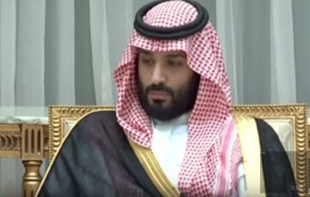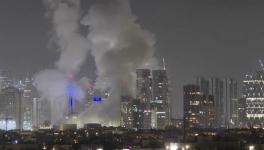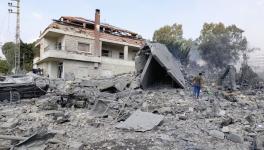An Upstart Saudi Prince Threw a Tantrum Felt Around the World

Image Courtesy: Screenshot / YouTube
What ails the royal court of Saudi Arabia? The Crown Prince—Mohammed Bin Salman—has arrested 11 rich and powerful princes and about 200 businessmen. These men of great wealth and might are being held in the Ritz Carlton hotel in Riyadh. Their assets are being seized in stages. Among these men is Alwaleed bin Talal, one of the richest men on the planet—whose holdings include Twitter and Citigroup, and Miteb bin Abdullah (Minister of the National Guard), Adel Fakeih (Minister of Economy and Planning), Bakr bin Laden (head of the Saudi Binladin Group) and Mohammed al-Amoudi (a businessman with substantial holdings in Ethiopia).
A tremor has gone through the hundreds of princes. Who is next? Will the Crown Prince’s loyal forces come for them next?
Why has the Crown Prince MBS—as he is known—arrested these men of great wealth and power? Was he afraid of a palace coup against him and his father, King Salman? It is certainly the case that the Crown Prince has arrested men who controlled sources of power (such as the National Guard) that were not seen to be loyal to his side of the palace. Having taken control of these forces, the Crown Prince has now made sure that there are no armed guards capable of undertaking a coup against him and his father. Military power is now consolidated around MBS.
The arrest of Alwaleed bin Talal and al-Amoudi suggests that this is also a crackdown on corruption in the Kingdom. Alwaleed bin Talal boasts of his billions, but there is ample evidence that when he has been caught flatfooted in a trade, he has turned to the Saudi banks for liquidity. It is pretty clear that he has used Saudi royal funds to stay afloat. He had trouble with his United Saudi Bank and with his investments in Teledesic and Planet Hollywood. Al-Amoudi, meanwhile, has been surrounded by the whiff of corruption over his investments in Ethiopia (his large farms and his gold mine). There is about $33 billion of personal wealth in the Ritz Carlton. Will the Crown Prince be able to take some of this money towards his project—Saudi Vision 2030?
Saudi Arabia’s attorney general Said al-Mojeb said that about $100 billion has been ‘misused through systematic corruption and embezzlement.’ He hopes that these arrests and the investigations that continue will result in the return of some of this money to the treasury.
A week before the arrests, Saudi Arabia hosted an investment conference attended by IMF chief Christine Lagarde and various bankers (including HSBC head Stuart Gulliver and SoftBank chair Masayoshi Son). At this conference, the Saudis presented their Vision 2030 plan to cut subsidies, increase taxes and offer its oil company—ARAMCO—to an initial public offering (IPO) sometime next year. The Saudis hope to raise $2 trillion in the IPO, a figure that is four times larger than the record-breaking Alibaba IPO in 2014.
Collapsed oil prices, largely by Saudi Arabia’s aggressive oil sales, have hurt the balance of payments in this oil-dependent monarchy. The kingdom is now running deficits of around $100 billion per year. The IMF has estimated that Saudi growth is ‘close to zero,’ with limited prospects for improvement in the future.
The Vision 2030 document—about which I wrote last year—was crafted by the consulting firm McKinsey. The prescriptions in the document called for diversification of the Saudi economy, a cut in public sector employment and a decrease in low-wage guest workers. The Saudi royals found this plan to be far too difficult to implement. The government tried to cut wage and benefits for the ministers and for public-sector workers. Discontent pushed the government to roll back these cuts in April 2017. To discourage guest workers is impossible, since the Saudi workforce is neither willing to do the low-end jobs nor does it have the skills to do the high-end jobs. There are too many structural barriers for the easy implementation of Vision 2030.
Which is perhaps why the Crown Prince decided to unveil his plans at the investment conference for the construction of a new city—NEOM. This city, which will extend across the Egyptian and Jordanian borders, will be powered by wind and solar energy. It is intended to be a global hub for innovations of various kinds. To build this city, the Saudis will plan to invest $500 billion and seek support from outside investors. The SoftBank Vision Fund’s Son called this a ‘fantastic opportunity’ and planned to invest in it. Others will follow. But there is a quixotic element to this plan. It looks good on paper but will once more rely upon a work force that comes from elsewhere, including other parts of the Arab world (such as Lebanon). There is no plan for a domestic high-tech workforce to be created for this tech-hub. That means that the fundamentals of Saudi Arabia’s economy will remain the same and its structural crisis will not be averted.
Which is perhaps why the Crown Prince attacked the clerics and the obscurantism in the kingdom. He made clear that before 1979 Saudi Arabia was not as backward looking and that this backward looking culture and strangled the possibility of modern education from creating a modern workforce. Of course, this obscurantism is not accidental. It has been a key part of Saudi ideology, which the Saudis exported across the Islamic world. To undo the power of the clerics without a major upheaval in the Kingdom is unlikely. Will the Crown Price dare to arrest the obscurantist clerics that oppose his new vision?
There is incoherence in the Crown Prince’s vision. On the one hand he wants to weaken the hold of the obscurantist clerics, but on the other hand he has taken a hard line against Iran—the very position that fans the flames of obscurantism in the Kingdom. It is sectarianism that is tinder for the clerics, a sectarianism that drove Saudi Arabia’s failed policies in Iraq, Qatar, Syria and Yemen. The Crown Prince’s sectarian wars have not succeeded. He has failed to overthrow Bashar al-Assad in Syria and failed to pacify the Yemeni people. He has failed to bring Qatar to heel and failed to lessen Iran’s power in Iraq. His tantrum over Lebanon has resulted in a serious political crisis in that country, but it will not succeed in weakening Hezbollah. All this only provides fodder for the obscurantists inside Saudi Arabia. Allowing women to drive is of course an important forward step, but it is hardly going to break the power of the obscurantist clerics over Saudi society.
ISIS has been defeated in Syria and Iraq. Iran is certainly more powerful in the region than ever before. Saudi Arabia does not like the way the geo-politics have turned out. Its tantrums from Qatar to Lebanon will not, however, change its position of weakness. The termites of corruption and social waste within the Kingdom have set its economy in a negative direction. These arrests as well as the attack on Lebanon are signs of great vulnerability in the royal household. It is unlikely that there will be any major collapse of the monarchy or a coup against the current king. This is unlikely. What is more likely is that Saudi Arabia—unable to move towards its Vision 2030—will create more mayhem in the region and create chaos inside its own society.
It is remarkable how this nation of 33 million has so easily been taken hostage by the whims of its Crown Prince and his phantasmagoric agenda.
Vijay Prashad is professor of international studies at Trinity College in Hartford, Connecticut. He is the author of 18 books, including Arab Spring, Libyan Winter (AK Press, 2012), The Poorer Nations: A Possible History of the Global South (Verso, 2013) and The Death of a Nation and the Future of the Arab Revolution (University of California Press, 2016). His columns appear at AlterNet every Wednesday.
This article was made possible by the readers and supporters of AlterNet.
Disclaimer: The views expressed here are the author's personal views, and do not necessarily represent the views of Newsclick.
Get the latest reports & analysis with people's perspective on Protests, movements & deep analytical videos, discussions of the current affairs in your Telegram app. Subscribe to NewsClick's Telegram channel & get Real-Time updates on stories, as they get published on our website.
























